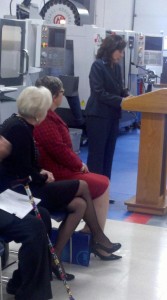 U.S. Secretary of Labor Hilda L. Solis visited Monroe Community College’s Applied Technologies Center on Sept. 24 to highlight a $14.6 million grant from the U.S. Department of Labor to a consortium of State University of New York community colleges, led by MCC.
U.S. Secretary of Labor Hilda L. Solis visited Monroe Community College’s Applied Technologies Center on Sept. 24 to highlight a $14.6 million grant from the U.S. Department of Labor to a consortium of State University of New York community colleges, led by MCC.
The grant, issued as part of the federal Trade Adjustment Assistance Community College and Career Training (TAACCCT) program, will allow a consortium of SUNY community colleges to design standardized curricula to directly address the needs of high-demand industries such as advanced manufacturing.
The consortium’s Training and Education in Advanced Manufacturing (TEAM) Educational Pathways Project would provide more than 3,000 of New York’s Trade Adjustment Assistance-eligible workers and unemployed veterans with the training and education required to find high-quality, high-wage jobs within the advanced manufacturing sector.
Solis was hosted by SUNY Chancellor Nancy L. Zimpher and MCC President Anne M. Kress. Community leaders in business development and advanced manufacturing, as well as elected officials, took part in the visit.
“When campuses are facing some fiscal constraints right now, [the grant] is an ability to create more capacity for good programs,” Solis said, lauding the consortium’s team approach – bringing together businesses, educators and community-based organizations – to put people back to work. “Manufacturing really is the ticket for our recovery.
“I hear from a lot of manufacturers that they can’t find skilled individuals,” Solis said. “The biggest challenge we are having is getting more people credentialed. … The president has said he wants to double down on seeing at least 2 million certificates in the coming decade, and we can do it easily in the community colleges.”
Kress said one of the greatest challenges in the Greater Rochester region is the strengthening of the workforce pipeline. “The supply chain for skilled workers is just not there,” she said. “With this funding from the Department of Labor, we would be able to take this effort to the next level, preparing a 21st-century workforce that will strengthen our region, our families, our communities and our nation.”
David Dahrsnin, who was laid off from management positions five times over the past 11 years, came to MCC in the fall to pursue a certificate in precision machining. “After the last downsizing in 2011, it was time to rethink my strategy,” said Dahrsnin, who is also a military veteran and holds bachelor’s and master’s degrees. “Through careful examination of the Department of Labor stats and facts, I determined the advanced manufacturing trade was a growing job sector and decided to pursue a new career as a precision machinist. Thanks to the federal grant, veterans like me can now have a second chance at a lucrative and stable career.”
Manufacturing in the Rochester region is alive and growing, said Jim Sydor, president and owner of Sydor Optics. His company manufactures precision optics for industries such as defense, entertainment and life sciences. “We are very busy. The lack of qualified advanced manufacturing workers is preventing us from growing,” Sydor said.
The Manufacturers Alliance of New York (MANY) and the Manufacturers Association of Central New York (MACNY), along with 150 other industry associations and employers across the state, have joined with the SUNY collaborative as key partners to validate curricula, develop and implement learn and earn strategies, raise awareness of the industry sector, and facilitate job placement. Manufacturers of all sizes and their representing associations will be involved from project design to implementation to placement and employment for eligible workers.
The grant is part of the Trade Adjustment Assistance Community College and Career Training initiative, which promotes skills development and employment opportunities in fields such as advanced manufacturing, transportation and health care, as well as science, technology, engineering and math careers through partnerships between training providers and local employers.

